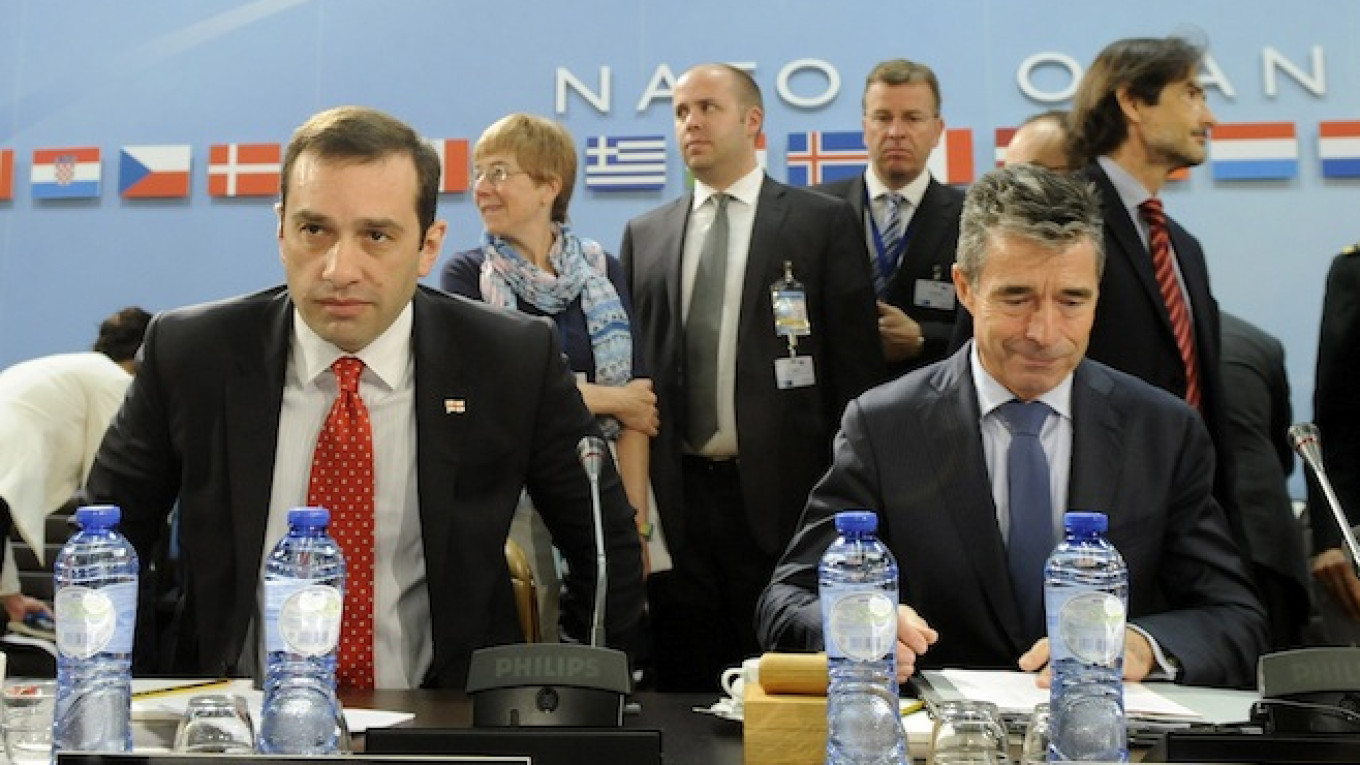NATO countries, wary of antagonizing Russia, are unlikely to grant former Soviet republic Georgia a formal step towards membership of the alliance at a summit in September, NATO diplomats say.
With NATO-Russia tensions running high after Moscow's annexation of Ukraine's Crimea region, the question of whether to invite Georgia to join the Membership Action Plan, or MAP, putting the country closer to its goal of NATO membership, has spawned conflicting views in the alliance.
Some allies oppose granting Georgia MAP membership, fearing it could provoke Russian retaliation, whereas others say it would look as if NATO was bowing to Russian pressure if it did not. One NATO diplomat said the alliance was split 50:50 — and therefore far from required consensus.
Hanging over the debate is the trauma of 2008 when Russia fought a five-day war with Georgia over a rebel province. Russian troops overran large parts of Georgia, humiliating its army and systematically wrecking a new base built to NATO technical standards.
After the war, Moscow recognized the breakaway regions of Abkhazia and South Ossetia as independent nations, making it much harder for NATO to take in and defend a divided country.
Months before the war, at a Bucharest summit, NATO had rebuffed U.S. demands Georgia and Ukraine be granted MAP while promising the two ex-Soviet republics would join NATO one day.
Washington may now tread more cautiously.
If Georgia became a member of the alliance, members would be obliged to intervene to defend it if it came under attack, another factor that would weigh heavily in future decisions.
Russia, which has said that its annexation of Crimea in March was influenced by the Western military alliance's expansion into eastern Europe, has made no secret of its hostility to its neighbor Georgia joining NATO.
NATO foreign ministers will discuss the prospects of Georgia and three other countries that aspire to join NATO in Brussels next week, with a final decision expected in September.
NATO's Deputy Secretary General Alexander Vershbow said in April that NATO needed to convey "a strong and convincing message on enlargement at our Wales summit."
"We will reaffirm that any decisions on future alliance membership are for NATO members alone to take and that no third party has any right of veto," he said.
Open Door
Despite the defiant talk, some allies feel it would be needlessly provocative to Russia — which still has several thousand troops near Ukraine's border -—to invite Georgia to join MAP now.
"It's not very likely they will get MAP," one NATO diplomat, speaking on condition of anonymity, said.
NATO should not show weakness, but it should also not take steps "that would irritate Russia without bringing anything to the alliance," he said.
But a diplomat from another country commented: "Not giving MAP to Georgia because of Russia is the wrong thing to do."
MAP is a program of advice, assistance and practical support tailored to countries wishing to join the alliance.
One diplomat said around a dozen of NATO's 28 members were reluctant to invite Georgia into MAP and predicted the alliance would be unable to reach the required consensus.
NATO appears likely to settle on a compromise by giving Georgia a package of "reinforced cooperation" with NATO that would fall short of MAP. This package could include measures such as closer political cooperation, training the Georgian armed forces and strengthening NATO's liaison office in Georgia.
The U.S. is putting a higher priority on preserving alliance unity at a time when NATO is locked in confrontation with Russia over Ukraine.
France thinks the timing is not right to invite Georgia to join MAP and Germany is also opposed, the diplomats said.
Some allies question whether NATO — whose limited military presence in eastern Europe has been exposed by the Ukraine crisis — could credibly extend its security guarantee to Georgia, with its two Russian-backed breakaway regions.
Hawks
The hawks on the issue are the former Soviet republics in the Baltics and some other east European countries, which argue NATO should send a tough message to Russia by granting MAP.
In 2010, Ukraine's former pro-Russian President Viktor Yanukovych ditched his country's goal of joining NATO. But Georgia has doggedly pursued its ambition of NATO membership and contributes 800 troops to the NATO-led force in Afghanistan.
NATO head Anders Fogh Rasmussen offered encouragement in loose terms at a defence ministers meeting this month.
"Georgia will be a member of NATO, provided that it fulfils the requirements of membership," he said. "I am confident that our next Summit will recognize Georgia's progress."
Georgian Defense Minister Irakly Alasania told Reuters after talks with NATO counterparts this month he remained hopeful that Georgia would be invited to join MAP in Wales but added: "I care less about wordings (and) more about the actions on the ground."
See also:
A Message from The Moscow Times:
Dear readers,
We are facing unprecedented challenges. Russia's Prosecutor General's Office has designated The Moscow Times as an "undesirable" organization, criminalizing our work and putting our staff at risk of prosecution. This follows our earlier unjust labeling as a "foreign agent."
These actions are direct attempts to silence independent journalism in Russia. The authorities claim our work "discredits the decisions of the Russian leadership." We see things differently: we strive to provide accurate, unbiased reporting on Russia.
We, the journalists of The Moscow Times, refuse to be silenced. But to continue our work, we need your help.
Your support, no matter how small, makes a world of difference. If you can, please support us monthly starting from just $2. It's quick to set up, and every contribution makes a significant impact.
By supporting The Moscow Times, you're defending open, independent journalism in the face of repression. Thank you for standing with us.
Remind me later.


